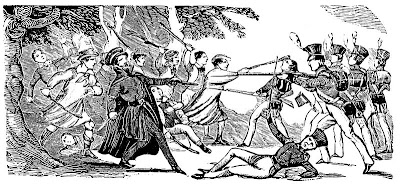 |
Scene at Bossenden Wood |
May 31, 1838 -- Kentish peasants clashed with armed British troops at Bosendon Wood. (From the Daily Bleed)
May 31, 1905
– The Spanish anarchist Alexander Farras threw a bomb into a procession
headed by French President Loubet and the King Alphonso XIII of Spain.
The leaders were not hurt, though several people were wounded. Farras
was never caught. Four other anarchists were arrested, tried and
acquitted. (From the Daily Bleed)
May 31, 1906
– Another attempt was made on King Alphonso XIII. This time, anarchist
Mateo Morral hid a bomb in a bunch of flowers and threw it at the King
during his royal wedding. Because he worked in Modern School’s
publishing house and was a friend of Francisco Ferrer (the founder of the first
Modern Schools), Ferrer was later arrested and imprisoned as an accomplice.
 |
| Protest for Sacco and Vanzetti in London, 1921 |
May 31, 1921
- The infamous trial of Sacco and Vanzetti, in which the two Italian
anarchists were railroaded for a crime they did not commit, began in
Dedham, Massachusetts. Judge Webster Thayer’s anti-worker and
anti-immigrant opening remarks set the tone for the trial. (From Workday Minnesota)
May 31, 1921
– Over 300 were killed in Tulsa, Oklahoma, in the worst race riot in
U.S. history. The violence was precipitated by a false report in the
Tulsa Tribune, accusing a black man of attacking a white girl in an
elevator. While the headline made the front page, there was an
accompanying editorial on the back page calling for a lynching. White
Tulsans began shooting blacks, and then looted and burned their homes
and businesses, completely destroying the black community of Greenwood. (From the Daily Bleed)
May 31, 1955 – The Supreme Court ordered school integration "with all deliberate speed." (From the Daily Bleed)
May 31, 1961 – A U.S. sponsored coup in the Dominican Republic led to the killing of Dictator Rafael Leónidas Trujillo. Dominicans then voted in Juan Bosch, who incensed the military and the ruling elite by refusing to buy military airplanes, announcing agrarian reforms, legalizing divorce, and increasing workers' wages. Within seven months there was another coup, by the same generals who led the coup against Trujillo, School of the Americas alumni: Generals Imbert and Wessin y Wessin. The U.S. immediately recognized the new government. (From the Daily Bleed)
May 31, 1968
–Student protests were spreading throughout the world, with protests on
this date in Vienna, in Denmark and Buenos Aires on June 1, and the
Yugoslav insurrection beginning soon after. Thousands of students went
on strike in Brazil on June 6, followed by protests in Geneva and Turkey, 20. (From the Daily Bleed)
May 31, 1986 – The Tiananmen Square demonstrations entered their 18th day, with 100,000 filling the Square. (From the Daily Bleed)
May 31, 2000
– Protesting teachers burn pamphlets at a fence around the Los Pinos
presidential residence in Mexico City, as riot police attempted to
protect the building. Teachers throughout the country had been
protesting for better wages and education reform since May 15.



